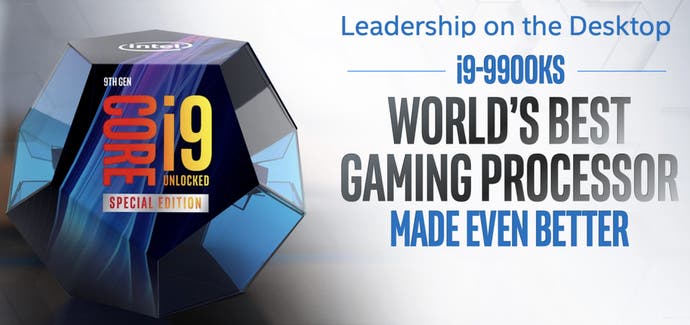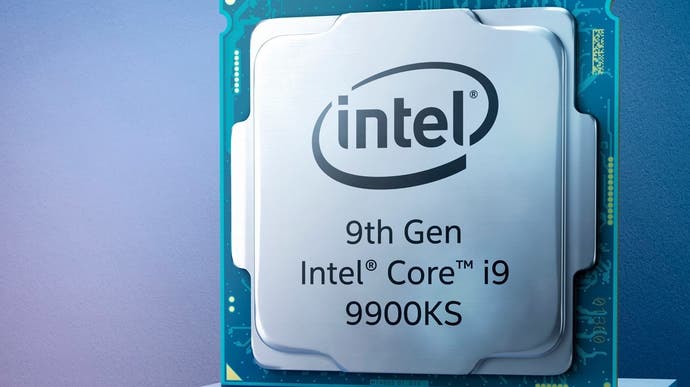Intel Core i9 9900KS review: the new fastest gaming CPU
When only the very best will do.
Intel's Core i9 9900KS has arrived - and it's a beast. This $599 limited edition processor was created from the best-performing 9900K models and is advertised as running at an all-core turbo speed of 5GHz, right out of the box - something only a fraction of 9900K samples could hope to achieve through careful manual overclocking. The 9900KS should also be capable of hitting a given frequency at a lower voltage than most 9900K units in the wild, making it an ideal choice for enthusiasts that want to achieve their high clocks at low temperatures. Given how well the 9700K and 9900K perform in most games, the 9900KS should take the crown as the fastest gaming processor on the market with its faster all-core turbo and higher 127W TDP - but the question is whether it's actually worth its higher price, when you can already get strong gaming performance from a range of much cheaper processors from AMD and Intel.
Before we answer that question with a selection of synthetic and game benchmarks, it's important to qualify exactly what you can expect from the 9900KS. Right from the off, the advertised 5GHz all-core turbo figure is a little misleading. The 9900KS can indeed turbo to that frequency on all eight cores, but whether it will stay there depends on your motherboard. On the Asus ROG Maximus XI Extreme board we're using with the 'multi-core enhancement' setting disabled, the 9900KS will hold that speed for about half a minute when faced with an all-core load, then throttle back down to a more reasonable frequency (eg 4.5GHz) to stay within its power envelope. With the MCE setting enabled, however, the chip's power requirements are relaxed substantially, allowing the chip to remain in that 5GHz turbo period indefinitely, assuming adequate power delivery and cooling.
We think that most users considering the 9900KS will be using a high-end motherboard with similar options to relax power limits - including some that will be configured like this out of the box - so our game testing was conducted with MCE enabled and power limits relaxed. If you do buy this processor, remember to check your in-game frequencies with software like Riva Tuner Statistics Server to make sure that your processor is operating to its full potential. Conversely, if electricity is expensive where you live or your power supply isn't up to snuff, you'll want to keep MCE disabled to maximise efficiency - and if that's the situation, you may be better off simply getting an existing Core i9 9900K or i7 9700K. F

| Core i9 9900KS | Core i9 9900K | Core i7 9700K | Ryzen 9 3900X | Ryzen 7 3700X | |
|---|---|---|---|---|---|
| Cores/Threads | 8/16 | 8/16 | 8/8 | 12/24 | 8/16 |
| Single-Core Turbo | 5.0GHz | 5.0GHz | 4.9GHz | 4.6GHz | 4.4GHz |
| Max All-Core Turbo | 5.0GHz | 4.7GHz | 4.6GHz | 4.1GHz | 4.3GHz |
| Cache (L2+L3) | 18MB | 18MB | 14MB | 70MB | 36MB |
| TDP | 127W | 95W | 95W | 105W | 65W |
| Prices* | $600/£550 | $472/£446 | $360/£330 | $530/£560 | $325/£290 |
*Lowest of Amazon and Newegg prices, as of time of writing. Limited availability of some Ryzen processors has resulted in higher prices for some models, so be sure to check your local prices for a more up-to-date look.
Let's cover the rest of our testing setup as well. We're running a fresh installation of Windows, with the latest security patches installed, on the fast Aorus 2TB NVMe drive provided by AMD for our Ryzen testing. The GPU here is the Nvidia GeForce RTX 2080 Ti Founders Edition, the fastest consumer graphics card available. The motherboard we used for the Intel processors is the premium ASUS ROG Maximus XI Extreme Z390, while AMD processors were tested on the MSI MPG X570 Gaming Plus and MSI Prestige X570 Creation. The Ryzen chips were cooled by the excellent (and bundled!) AMD Wraith Prism air cooler. Intel's high-end processors don't come with a cooler, so we opted for a Gaming Storm Castle 240mm AiO that performs extremely similarly to AMD's solution (although you'll have to add the cost of a competent cooler to any build you consider). In each case, we used G.Skill Trident Z Royal 3600MHz CL16 RAM provided by AMD, a hefty 850W power supply and an open-air test bench.
While gaming performance is the obvious focus here, it's important to for us to have a quick look at content creation workloads as well. AMD has performed well here with their most recent processors, thanks to their greater numbers of cores and threads, but the 9900KS with its eight cores and very high frequencies should also be a reasonable choice. To see if it noticeably outperformed the 9900K, and how well it stacked up to third-gen Ryzen, we turned to Cinebench R20. This benchmark measures the time it takes each CPU to render a still 3D scene, both with a single core at a time and with all available cores. While the test is still technically synthetic, high scores here do predict faster performance in Cinema 4D, a professional video software package.
We tested the 9900KS with multi-core enhancement (MCE) enabled and disabled, so you can see the performance differential between sticking to the default power limits and exceeding them - it's pretty substantial. With MCE enabled, we saw a six per cent up-tick in performance in Cinebench R20 multi-core and a nine per cent increase in Handbrake transcode speeds. Generally, the longer the sustained load, the greater the performance increase (but the more energy consumed) from keeping MCE enabled.
Our testing shows that the 9900KS is faster than the 9900K in content creation workloads, thanks to its higher frequency, but the advantage is marginal at best. Transcode operations in Handbrake ran only about one fps faster regardless of codec, while Cinebench scores increased by around six per cent. That means the 9900KS is nowhere near fast enough in these workloads to challenge its Ryzen equivalent, the 3900X, which remains about 35 per cent faster in Cinebench and 33 per cent faster in Handbrake x264 encoding. The 9900KS is slightly more competitive when it comes to handling AVX instructions but still falls behind, with the 3900X leading the 9900KS by only around 20 per cent in our h.265 encode test. The Ryzen 3900X is also much more power efficient, particularly when the 9900KS is run with its power restrictions disabled. In total, we measured 355W at the wall for our 9900KS system with MCE enabled, compared to just 228W for the 3900X - more than 55 per cent higher.
We also used the Intel Performance Maximizer software to overclock the 9900KS sample we were provided. After making our installation compatible with the software (which involved ensuring the BIOS was set to its default settings and converting our legacy MBR partition to GPT), it took about an hour for the software to test various frequencies and voltages with frequent reboots in between. We ended up with an all-core overclock of 5.1GHz, a speed that the top 31 per cent of 9900KS units are able to achieve according to Silicon Lottery, at a frequency of 1.344V. This boosted our performance in Cinebench and Handbrake by a couple of percentage points, while power draw increased by around 10W.
| Core i9 9900KS @ 5.1GHz | Core i9 9900KS @ 5.0GHz | Core i9 9900KS @ 5.0GHz (MCE off) | Core i9 9900K @ 4.7GHz | Ryzen 9 3900X | |
|---|---|---|---|---|---|
| Cinebench R20 1T | 521 | 518 | 516 | 493 | 514 |
| Cinebench R20 MT | 5267 | 5182 | 4908 | 4895 | 7032 |
| Handbrake h.264 | 39.88fps | 38.99fps | 35.73fps | 37.14fps | 51.80fps |
| Handbrake HEVC | 16.99fps | 16.77fps | 15.24fps | 15.97fps | 20.29fps |
| HEVC Power Consumption | 365W | 355W | 254W | 289W | 228W |
So content creation workloads remain the domain of AMD, which is more or less what we expected - but how does the 9900KS handle games? The 3900X puts up a good fight against the 9900K at the top of each team's product stack, but ultimately the 9900K is the better gaming CPU with higher frame-rates (and improved worst one per cent averages too) in pretty much all games. That should make the 9900KS an even better option, but will the advantage be enough to justify the higher price?
To find out, we needed to find sections of popular games that actually show significant differences between different processors. This is harder than it looks, as CPU-limited runs are by their very nature much more prone to random interference (ie a process starting up in the background, tanking performance) than GPU-bound situations. CPU load is also much more variable; instead of cranking up to 99 per cent once the game begins and only returning to idle speeds once you hit the desktop, processors will spool up and spin down throughout a session as different game subsystems are called upon.
Different processors will handle these challenges differently, so it's quite possible for Intel's best to be temporarily stumped by AMD or vice versa. That's why we recommend checking out our video review, embedded above, or watching through the videos embedded near each set of results to see how the different CPUs we tested handle each scene in real time. This provides much better insight into true performance - like the prevalence of annoying stutters or dips - than a simple average fps figure will ever provide.
We tested each game at 1080p, 1440p and 4K, as the number of pixels on screen has an interesting relationship with relative CPU and GPU performance. At 1080p, chasing high frame-rates requires a powerful CPU and fast memory, with a high-end GPU like the RTX 2080 Ti we're using often being under-utilised. This kind of a setup makes sense for anyone looking to make the most of a 144Hz or 240Hz monitor, despite the stutter that being CPU-bound introduces - although many games may run nearly as fast with a considerably cheaper GPU. 1440p is the current resolution sweet spot, where our high-end system can still be CPU-bound in some titles but stutter is less common than at 1080p. Here, even mid-range systems can push 60fps or higher to make use of high refresh-rate monitors. 4K remains the most balanced scenario for our test rig, where there's normally enough CPU overhead to keep the GPU the limiting factor, outside of a few older esports titles (CS:GO, we're looking at you).
Intel Core i9 9900KS analysis
- Introduction, hardware breakdown, test system [This Page]
- Gaming benchmarks: Assassin's Creed Odyssey, Battlefield 5, Far Cry 5
- Gaming benchmarks: Crysis 3, Metro Exodus, Kingdom Come Deliverance, The Witcher 3
- Gaming benchmarks: Core vs Ryzen - memory bandwidth analysis
- Intel Core i9 9900KS: the Digital Foundry verdict

